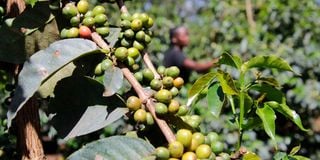
Deputy President Rigathi Gachagua threw the entire market into a spin by recommending the suspension of all coffee licences.
| File | Nation Media GroupWeekly Review
Premium
Why Rigathi Gachagua plan to deal with coffee cartels is hurting farmers
For the first time, Kenyan farmers are stuck with coffee worth millions of dollars they cannot sell. Reason? The William Ruto government, in its bid to get rid of the market of cartels, suspended all licences, leaving the market in a crisis.
As a result, Kenya has locked herself out of the international market when blend changes are happening in the consumer markets, and estate and smallholder farmers are facing uncertainty. More so, the indecision comes when the industry is increasing Robusta use to escape the price spikes in Arabica, Kenya’s main export.
The current coffee crisis started on July 6, after a two-day meeting in Meru led by Deputy President Rigathi Gachagua threw the entire market into a spin by recommending the suspension of all coffee licences.
While the Agriculture Food Authority (AFA) had warned Agriculture Cabinet Secretary Mithika Linturi that the revocation of the buyers’ licences would affect the coffee trade at the Nairobi Coffee Exchange, the CS vowed to revoke the licences. “I do not care if they take me to court or not,” he said. The ramifications have been dire for both the smallholder and estate farmers – the unsold coffee owners. “Coffee is now stockpiling. If more coffee ends up in the market, the prices will drop sharply, and we are all going to lose,” a large-scale farmer told The Weekly Review.
It is estimated that there are upward of 250,000 bags of coffee of 60kg each in the warehouses – equivalent to 15 million kilogrammes of Arabica coffee. More coffee is lying in the stores, and farmers are now forced to hire security to protect it from thieves. More so, estate farmers who were farming under contract are now eyeing losses running into millions of shillings since they cannot deliver to the international market.
Unlike yesteryears, when Kenya was a significant player in the coffee industry, today it contributes less than one per cent of coffee to the world market, and farmers fear that their buyers could quickly turn elsewhere. Buyers know, for instance, that Rwanda has the same coffee profile as Kenya.
The farmers’ fears are compounded by the International Coffee Organisation’s report early this month, which indicated that demand for high-quality coffees was falling as buyers sought lower-priced alternatives such as Robusta coffee to reduce cost and maintain profit margins.
According to the ICO, the high-interest rates in Europe and the US have forced buyers to switch to cheaper coffees. The rates “limit how big purchasing budgets can be, with buyers focusing on more competitive origins and shying away from the more expensive growths”. By closing its entire market rather than targetting the known cartel networks, Kenya has created a storm that the regulator, AFA, foresaw. The regulator had warned against such a move, arguing that it would disrupt the market.

A farmer tends to her coffee in Nyeri town on October 25, 2022.
Unknown to many local farmers, the global market is focusing on the cheaper Robusta beans, which have shown higher traded volumes in the 2022/23 season. The surge in Robusta prices has also put pressure on Arabica beans, which are the mainstay of local farmers. The ICO has reported that the difference between current prices for Arabica and Robusta beans is the smallest since October 2020. Approximately 95 per cent of coffee produced in Kenya is exported mainly to the United States, Belgium, Germany and South Korea, meaning there is no local market for coffee. While international roasters value Kenya’s coffee for its acidic blending, some shifts in blending could hurt the Kenyan farmer if the closure is prolonged.
Before the disruption, Kenya’s coffee production and exports were expected to grow by about 6.7 per cent and 5.5 per cent respectively due to improved rain conditions, government subsidies on fertiliser, and high prices. But the shutting down of the market might tamper with sales projections. It had been estimated that in the marketing year 2023/24, Kenya would export 760,000 bags.
“If more bags are dumped into the market at the same time, the prices will drop,” says an estate farmer.

Deputy President Rigathi Gachagua (centre) with Buuri MP Mugambi Rindikiri (left), Governors Stephen Sang (Nandi), Kawira Mwangaza (Meru) and Kahiga Mutahi (Nyeri) at Three Steers Hotel in Meru County on June 9, 2023, during a coffee conference.
A Reuters poll early in the year had projected that Arabica coffee prices were expected to drop 13 per cent this year due to an alleged increase in Brazilian coffee, which should lead to a global surplus of beans in the 2023/2024 season. According to the survey’s median forecast, prices are expected to end at US$1.48 per pound in 2023. Last month, Citi Research, the market research unit of US bank Citi, cut its outlook for Arabica coffee by 5 cents to US$1.85 per pound at the end of 2023.
Whether Gachagua and Linturi know the import of the closure is not clear. While Kenya has high-quality Arabica coffee, it has, over the years, failed to streamline the market or engage with other producers in Africa to overhaul international trading. The coffee crop is still highly regulated at home, and 90 per cent of coffee sales have to go through the Nairobi Coffee Exchange, an old bureaucratic spot market and auction platform. Remaining purchases are arranged via direct sales through contracts negotiated between agents of producers and exporters. There is also the skewed global trade that does not favour the producer.
It appears that Linturi did not have a plan B. For a month now, Kenya has not sold coffee to international buyers, denying itself foreign exchange and leaving farmers, millers and marketers in limbo. Meanwhile, international buyers of Kenyan coffee are left in a quandary since they have not been told where they can buy the coffee after the closure of the Nairobi Coffee Exchange.
Coffee left in stores is prone to theft. “The good intentions have ended up affecting the entire coffee value chain,” a coffee grower says. Smallholder farmers, the people the government wanted to protect from the cartels within the sector, now have to hire security to protect their coffee beans.
Moreover, if this stalemate lasts longer, farmers with bank loans will not be able to repay them, yet they will need more money to prepare for the next season. And ultimately, lack of movement of the produce could open illicit trade in the region, similar to the 1970s, when Uganda was shut out of the international market, leading to the smuggling of coffee at the Busia border.
Whether Gachagua and Linturi will move quickly to sort out the chaos in the coffee market remains to be seen.





